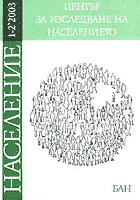Остаряване на българското население през миналия век – повъзрастови ефекти и емпиричен анализ
Age effects on population ageing in Bulgaria during the last century
Author(s): Emil HristovSubject(s): Social Sciences
Published by: Институт за изследване на населението и човека - Българска академия на науките
Summary/Abstract: This article is the second one of a series, dedicated to methodology and analysis of population ageing (see also Nasselenie, 2002, No 1-2). The mean age of the population is used as a basic measure of population’s “age”. If the ages of two populations are to be compared, the contribution of different age groups’ shares to the difference between both means is estimated. So, the extent of a population’s ageing is expressed through the change of its initial age. According to the author, at the beginning of the 20th Century Bulgarian male population had had mean age of 26,0 years and Bulgarian female one had had 25,4 years. At the end of the Century, as a result of ageing by 13,3 and 16,5 years respectively, male population reached mean age of 39,2 years and female one – 41,8 years. As mentioned in the first article, the ageing process had been more intensive during the second half of the 20th Century. This difference in process intensity approached 3 times in men and exceeded 2 times in women. This method could be applied in estimating the effects of separate values of any variation sign upon its mean.
Journal: Население
- Issue Year: 2003
- Issue No: 1-2
- Page Range: 18-28
- Page Count: 10
- Language: Bulgarian
- Content File-PDF

